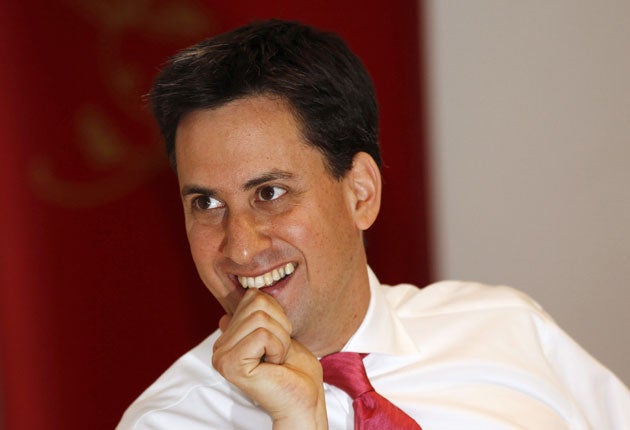Andrew Grice: Why Labour's voting system puts Miliband junior in pole position
Inside Politics

"Cameron's coming," said the former Gordon Brown aide, spotting a familiar Special Branch face in the Prime Minister's advance guard. A gaggle of former Downing Street political advisers were lunching in Portcullis House, the bustling market place of the Commons, time on their hands for the first time in years.
The Labour aides looked on enviously as David Cameron and his entourage snaked through the crowded atrium. Two weeks earlier, they would have been part of the power crowd. A civil service speechwriter took pity, risking a sneaky handshake behind the new Prime Minister's back with a former Brown adviser who called out to him. Mr Cameron marched purposefully, looking every inch the statesman, but then threw a big smile and a thumbs-up sign to a coffee-drinking Conservative MP.
Labour is on the margins as the Liberal-Conservative coalition sets the political agenda at a cracking pace. But Labour has an important decision to make too: it must choose a new leader and potentially, the country's next prime minister.
David Miliband, the shadow Foreign Secretary and front-runner, was first out of the traps and wanted the party to make a decision by July. Labour has wisely put it off until September. It needs time to think and recent leadership elections suggest a party that does so makes the right choice; Mr Cameron would not have beaten David Davis in a quick Tory contest in 2005. David Miliband should have nothing to fear from a longer campaign. His backers say he has the experience, judgment and intellect to "win" in the country. But can the former Foreign Secretary win over his party?
Critics claim David Miliband lacked decisiveness in not toppling Mr Brown before the general election; his backers reply that the bloody civil war could have produced a worse result. Secondly, he is too "geeky". Allies admit people might not want a pint with him but insist focus groups see him as a steely leader. He is stuck with an unwanted "Blairite candidate" label even though he regularly disagreed (from stage left) with the boss he served as policy head and minister.
Mr Balls must carry a similar millstone, inevitably being seen as the "Brownite candidate" after 16 years at Mr Brown's side and therefore too associated with the ruthless Brown machine. Critics don't doubt his intellect or steel but the other bad part of the Balls caricature is that he is tribal Labour, a pugilist too aggressive for the public's liking, who would put Labour at the head of every anti-cuts march. "Ed doesn't do nuance," says one rival.
I detect a strong Labour desire to move on from the Blair-Brown era that could work against David Miliband and Mr Balls – at first glance the two candidates most likely to win. It could help Ed Miliband, who somehow managed to remain neutral in the Blair-Brown wars while working for Mr Brown. He is right to challenge his older brother; they would work well together if either man won. In 1994, Mr Brown gave Mr Blair a free run and wrongly felt deprived of the prize. With hindsight, the two modernisers should have fought it out, as the Milibands do now.
Ed Miliband's supporters do not like comparing him to his brother and there is a noticeable absence of war (and major policy differences). When pressed, they say David offers brains without charisma while Ed offers both and can therefore reconnect with Labour's lost supporters while uniting the party. Ed Miliband's critics claim he lacks the experience or instant judgement to handle unexpected events and would offer compromises rather than strong leadership – more Neil Kinnock (one of his main sponsors) than Mr Blair. Mr Brown is said to have described Ed Miliband as "a cross between an academic and a preacher". Quite a lot of Labour members may like the sermon.
Andy Burnham, the shadow Health Secretary, cannot be discounted, although he may be crowded out by the Miliband brothers. Left-wing contenders Diane Abbott and John McDonnell may struggle to get the required 33 nominations from MPs.
Forget the bookies' odds, which make David Miliband the favourite. The crucial thing is not only who has the votes but the voting system – the alternative vote, on which the coalition Government has promised a referendum for Commons elections. People mark candidates in order of preference. Unless any candidate wins more than 50 per cent of the votes (unlikely in the Labour race), he or she can easily be overtaken; the candidate coming last is eliminated in each round and the second preference votes of those who backed him or her are redistributed until one candidate secures more than 50 per cent.
We don't need a crystal ball when we can read the book: Harriet Harman did not come top in any round in Labour's deputy leadership election in 2007 but pipped Alan Johnson in the run-off. The person most likely to benefit from the voting system this time is Ed Miliband.

Join our commenting forum
Join thought-provoking conversations, follow other Independent readers and see their replies